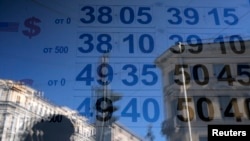European Union ambassadors meeting in Brussels agreed to extend current economic sanctions against Russia for another six months because the conflict in Ukraine remains unresolved.
Envoys from the bloc’s 28 member states approved the decision in principle Tuesday. It still needs a unanimous formal approval by EU ministers which may come during their meeting in Luxembourg Friday or it may come at an EU leaders' summit next week, or even later, diplomatic sources in the Belgian capital said.
Sanctions currently in effect have targeted the oil, financial and defense sectors of the Russian economy.
They were first imposed after Moscow's annexation of Crimea from Ukraine in March 2014 and backing of pro-Russian separatists in the Donbas region of eastern Ukraine.
The EU is planning a broader review of its policy on Russia in the second half of this year.
Current sanctions are due to expire at the end of July and, and if approved, will now run through January 2017, those at the meeting said.
German Foreign Minister Frank-Walter Steinmeier and Italian Prime Minister Matteo Renzi are among Europe's top politicians backing sanctions relief. In April, the French parliament approved a non-binding resolution calling for the lifting of EU sanctions against Russia.
The EU, in early 2014, also imposed separate visa bans and asset freeze measures against individual Russian and Ukrainian high-profile individuals for backing the separatist movement in eastern Ukraine. These measures are set to expire in September.
More than 9,000 people have died in the fighting in eastern Ukraine since early 2014 and rival sides in the conflict have yet to withdraw heavy arms from the region.
